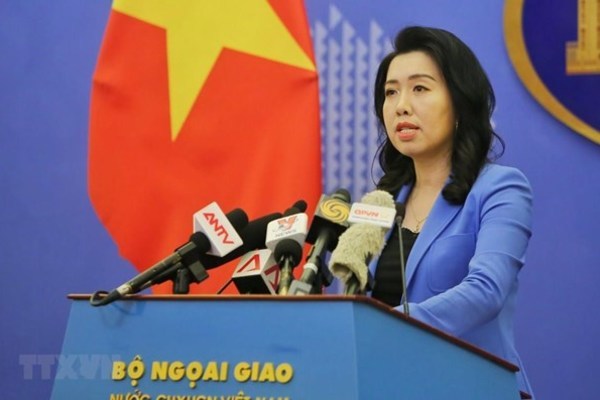 |
| The interface of VietnamPlus's paid news site that launched on June 20, 2018. — VNA/VNS Photo |
The country’s print newspapers have faced an unprecedented loss in revenue, mostly from advertising as companies are forced to cut expenses amid and post COVID-19. Online news outlets have witnessed an increased readership yet their incomes reportedly have remained unchanged.
“Many newsrooms have had to suspend, reduce royalties, cut costs and even dismiss workers,” said Luu Quang Dinh, editor-in-chief of Nông thôn Ngày nay (Countryside Today) newspaper.
The total revenue of Vietnamese journalism including newspaper, radio and television outlets in 2019 was only VND16 trillion (US$686 million), equivalent to the advertising revenue of online platforms including Facebook or Google in Vietnam, according to Luu Dinh Phuc, head of the Authority of Broadcasting and Electronic Information under the Ministry of Information and Communications (MIC).
“Over the past 10 years, international online platforms have pocketed nearly 50 per cent of the advertising market share. The loss of revenue will lead to a drop in content quality and influence of traditional communication channels,” said Phuc.
“The need to make ends meet will push journalism away from its core principles,” he added.
Diversifying revenue streams and applying paywalls are two possible solutions to tackle the financial problems Vietnamese newspapers face.
“It will be risky if newspapers depend solely on a certain income. There should be new policies to support and invest to ensure the efficient operation of the State’s essential communication tools; heads of press agencies also need to change their mindsets and update new approaches to move their agencies forward,” said Phuc.
Le Xuan Son, editor-in-chief of Tiền phong (Vanguard) newspaper, said responsible ministries and State agencies should come up with solutions to direct part of the advertising market share of foreign online social networks to domestic agencies and encourage or force mobile network operators to share part of the revenue from internet services with online news outlets.
Pham Anh Tuan, editor-in-chief of online newspaper VietnamNet, said in the world of fake news, readers will have to get used to paying for news to access to quality information and content.
Instead of producing clickbait, newsrooms should focus on providing subscription packages and at the same time, raise the bar for article quality, Tuan said.
In the transition to paid media, newsrooms would have to pay close attention to copyright issues, Phuc added.
On June 20, 2018, VietnamPlus under Vietnam News Agency became the country’s first online newspaper to charge fees for articles.
Only five to 10 articles of 200 VietnamPlus’s daily releases are paid content, including exclusive interviews and analyses. Readers can pay per article at VND5,000 (US$0.21) each or pay for access for a week for VND10,000, 30 days for VND30,000 or 60 days for VND50,000.
“Although it is challenging to collect fees from readers in Vietnam, it is a must for newsrooms that want to change their revenue structures,” said Tran Tien Duan, editor-in-chief of VietnamPlus.
“First things first, they have to protect their copyrights over articles,” he added.
As AI can provide personally curated news, voice assistants can become new portals to access media and blockchain can offer new forms of payment and verification, Vietnam’s journalism could ride the emerging wave of technological innovations and create attractive products and sustainably develop, said Phuc. VNS

Journalists must embrace technology or risk being replaced: Minister
Vietnamese media could be falling behind the relentless march of technological development and need to catch up soon, said Information and Communications Minister Nguyen Manh Hung.

Vietnam rejects report of Committee to Protect Journalists
Vietnam absolutely rejects false contents, which are based on inaccurate and biased information about Vietnam, of a report released by the Committee to Protect Journalists (CPJ), the Foreign Ministry’s spokeswoman Le Thi Thu Hang has said.
 The COVID-19 pandemic has cost many Vietnamese newspapers half their income, editors-in-chief said at a conference on Friday hosted by the Vietnam Journalists’ Association.
The COVID-19 pandemic has cost many Vietnamese newspapers half their income, editors-in-chief said at a conference on Friday hosted by the Vietnam Journalists’ Association.